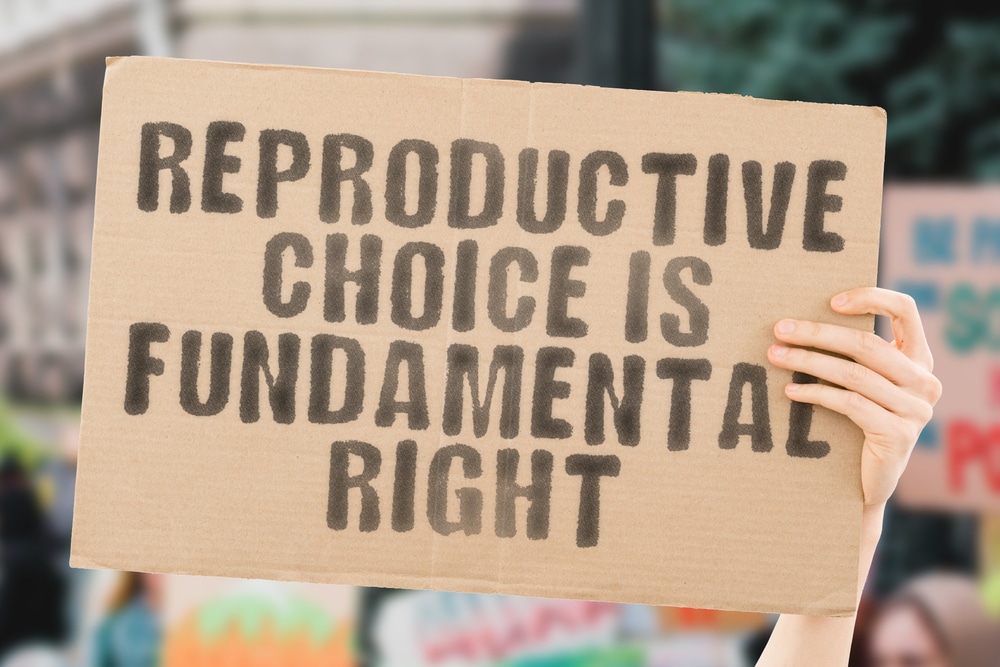Pennsylvania 1st congressional district candidate Ashley Ehasz and public-interest attorney Kathryn Kolbert sat alongside doctors and activists discussing the impact of overturning Roe v. Wade at the Women’s Reproductive Rights Forum at Bucks County Community College on Thursday night.
The forum organized by Social Justice Indivisible highlighted the potential for a national abortion ban, medical perspectives on the impact of the Dobbs decision, and the importance of voter engagement to protect reproductive freedoms.
Kolbert, who argued against five Pennsylvania abortion regulations in the 1992 Planned Parenthood v. Casey case, spoke about the paths to a national abortion ban due to the legal and political landscape. She warned that losing control of the Senate and the House, at the state level and federal level, could strip Pennsylvania and the country of its reproductive rights.
“Donald Trump … if he wins the election, he wins the Senate, he takes the House, they will have the power to enact a national ban but that’s not the only way he could do it,” Kolbert said.
Kolbert said she foresees the Comstock Act of 1873 as the second way Trump could enact an abortion ban. The Comstock Act, which prohibits U.S. mail carriers from delivering abortion materials, could stop the dissemination of mailing drugs and materials used to perform abortions if implemented.
“Right now, the only thing standing in the way of it being enforced is an interpretation by the Justice Department and Merrick Garland,” said Kolbert. “Trump comes in, appoints his own attorney general. It’s never going to be good, but he could reverse interpretation, and that will begin a fight over the national implementation of an abortion ban at the federal level based on a law passed in the 1800s.”
While Pennsylvania’s laws still provide access to abortion care, a national abortion ban could take away that access from Pennsylvania residents. Ehasz, who spoke about her experience with station assignments affecting the reproductive freedoms of women in the military, said it was important for Democrats to hold on to the majority in the Senate, win back the House, and hold the White House to put abortion protections in place.
“Even though we have protections here in Pennsylvania, we just outlined, like, there are actually not that many clinics and in Bucks County, we only have one right now,” said Ehasz. “There’s one Planned Parenthood in Bensalem.”
There are significantly less facilities providing abortions compared to the 160 unregulated anti-abortion pregnancy centers in the state.
READ: Abortion Has Passed Inflation as the Top Election Issue for Women Under 30, Survey Finds
‘Even in states where abortion is protected, such as here, there’s still a real obstacle to a lot of women getting that care,” Ehasz said.
Elizabeth Lee, forum moderator, stated that the ratio of anti-abortion pregnancy centers to abortion providers is nine to one in the Pennsylvania compared to the national ratio of three to one. While Crisis Pregnancy Centers (CPCs), organizations run by anti-abortion activists, manage to intercept people seeking medical care, the state has taken steps toward reducing the support the centers receive.
“The good news is that the Shapiro administration stopped directly funding anti-abortion activists via the CPC industry at the end of 2023 and reallocated that funding to evidence-based support for pregnant Pennsylvanians,” Lee said.
Leah Greenberg, a political activist and co-founder of SJI, has been involved in building the Women’s Health Protection Act (WHPA). The bill, introduced after the Dobbs decision, would ensure access to the rights and protections that were set under Roe v. Wade.
“We are hoping to be more expansive in the ways in which we’re ultimately able to guarantee and protect reproductive freedom nationwide,” Greenberg said.
Legislation like WHPA will face significant obstacles in a split or majority Republican Congress. Greenberg also said the filibuster can be an obstacle as it has been used to hinder progress on legislative issues like gun control and reproductive freedoms.
A second Trump presidency would usher in Project 2025 which would damage women’s reproductive freedoms and access to abortion care. The plan urges the government to reject abortion as health care, restrict access to abortion pills, and use the Comstock Act as Kolbert laid out.
“It’s a wide and expansive document, but what it ultimately details is that this will turn into a very sinister place to be, and that the government will be criminalizing women for being with essentially, and going after them, and coming back to the importance of elections,” Ehasz said.
Locally, Bucks County’s Republican Congressman Brian Fitzpatrick has his own history of acting against access to reproductive freedom. Fliers detailing Fitzpatrick’s “awful record on reproductive freedom” were available at the forum. It included Fitzpatrick’s history of backing CPCs, voting for abortion bans, and voting against WHPA.
READ: Don’t Let Him Fool You, Rep. Brian Fitzpatrick Is Anti-Choice
“We have seen Brian Fitzpatrick kowtow to the very far right at every single term. He claims he’s Mr. Moderate, bipartisan.” said Ehasz. “And there’s others like him Countrywide, but when we get right down to it, they kowtow to everything that Donald Trump asks because they are deeply fearful.”
The two doctors on the panel attested to the effects anti-abortion policy will have on people. Dr. Anusha Viswanathan, a pediatric infectious disease doctor, shared her personal experience with having an abortion and said the anti-abortion movement “erased our agency.”
Dr. Jess Klemens, an OB/GYN, shared her experience with the effects the Dobbs decision had on physicians. Klemens said she’s seeing more physicians leave states with abortion restrictions as well as medical students and residents choosing to train in states with abortion access.
Klemens also spoke to the concerning effects the Dobbs decision is having on patients. Patients are arriving to Pennsylvania from other states for care and young patients are more active in asking for sterilization or effective birth control methods like IUDs.
“Some of these young folks are, you know, have been thinking about this for a long time, but it was this decision politically that made them really take that next step to come in and discuss it with their physician and be proactive about what they’re doing,” Klemens said.
READ: More Women Are Seeking Sterilizations Post-Dobbs, Experts Say
The forum encouraged the women and men in attendance to talk to their neighbors and support the candidates that will protect reproductive freedoms in both Pennsylvania and at the federal level.
“I truly believe this, it will be women who save us and save our democracy yet again in 2024,” said Ehasz. “We are angry, justifiably angry, but we are also putting in the work to make sure we get our reproductive rights back.”







